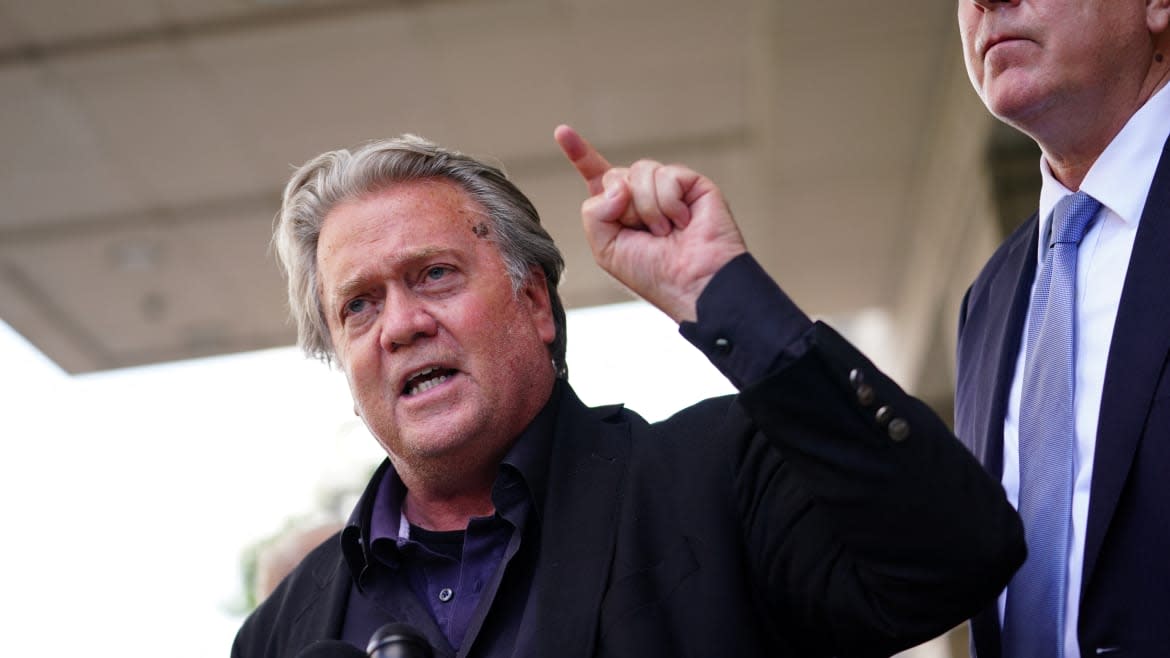Bannon Accused of Poisoning His Own Trial

- Oops!Something went wrong.Please try again later.
- Oops!Something went wrong.Please try again later.
Federal prosecutors on Wednesday morning fiercely attacked Steve Bannon for seemingly trying to poison his own ongoing trial, citing the rightwing media personality’s decision yesterday to decry the government at a press conference held just a few feet from the door of the District of Columbia federal courthouse.
Both sides held arguments in the morning before jurors made their way into the courtroom to continue hearing witness testimony from Kristin Amerling, an attorney with the Jan. 6 committee whose subpoena Bannon flagrantly ignored last year.
Amerling, who serves as the committee’s chief counsel and deputy staff director, started her testimony Wednesday by answering basic questions about when Bannon was supposed to turn over records and appear for testimony. The line of questioning comports with the Justice Department’s stance that this is an open-and-shut case merely about Bannon’s willingness to ignore the congressional subpoena.
Prosecutors Say Bannon Case Is Open-and-Shut
“There had been a number of public reports stating that Mr. Bannon had been in communication with White House officials, including former President Trump in the weeks leading up to the January 6th events,” she said. ”We wanted to understand what he could tell us about the connection between any of these events.”
The committee had demanded that Bannon turn over documents by Oct. 7, 2021 about his private communications with various Trump-loyal groups that have intimidated progressives for years and played a decisive role in the attack on the U.S. Capitol, including the Proud Boys street gang and two armed militias, the Oath Keepers and Three Percenters.
The committee also sought copies of any text messages and emails Bannon exchanged with notorious conspiracy theorist Alex Jones, disgraced former national security adviser-turned-QAnon adherent Gen. Michael Flynn, and Trump lawyers who took part in the effort to overturn the 2020 election results: Rudy Giuliani, John Eastman, Jenna Ellis, and Sidney Powell.
Congressional investigators also wanted to explore any conversations Bannon had with Rep. Scott Perry (R-PA), who played a pivotal role in elevating Jeffrey Clark, a Trump loyalist, at the Justice Department to put him in a position to misuse the law enforcement agency as a tool to potentially seize voting machines and intimidate swing states that had favored Biden.
Steve Bannon Has a Very Bad Day in Court
The trial got underway on Tuesday afternoon after a bumpy start that included a search for a batch of jurors who attorneys felt could fairly judge Bannon—by not already having strong feelings about the rightwing provocateur.
In December, aspects of Bannon’s involvement in the run-up to the insurrection and the plot to overturn now-President Joe Biden’s victory were well publicized. Bannon and his companion, former Trump White House official Peter Navarro, came up with a plan they dubbed the “Green Bay Sweep” that involved getting Trump-loyal Republicans in Congress to slow down the official counting of the 2020 electoral ballots—creating a delay to increase the pressure on Vice President Mike Pence to refuse to certify the election results.
But additional details keep coming. Just last week, the Jan. 6 committee revealed there were White House call logs showing that Trump twice spoke to Bannon on the morning of Jan. 5—just before Bannon announced on his podcast that “all hell is going to break loose tomorrow. It's all converging, and we're on the point of attack.”
That announcement put a target on his back. On Wednesday morning, Amerling testified that Bannon’s warning showed he "might have had advance knowledge" about the attack the next day.
From the start, federal prosecutors have said Bannon’s trial will take no more than a few days, given the plain-as-day facts about the case: he was ordered to show up to be deposed by the committee and didn’t.
Bannon’s defense team has repeatedly told U.S. District Judge Carl Nichols that the case involves much more nuance. But just a week before the trial, the judge was already dismantling many of the defense’s legal arguments.
Lawyer’s Bombshell: Trump Never Bothered to Invoke Executive Privilege for Steve Bannon
When Bannon’s team argued that their client relied on his personal attorney for legal advice, Nichols pointed to established legal precedent that doesn’t allow someone to rely on that excuse. When the team claimed Bannon got approval from the former president to invoke executive privilege, Nichols noted that Trump was no longer president—and Bannon hadn’t worked in the White House in years. And when Bannon argued that, as a one-time White House official long before the insurrection, internal DOJ policy somehow allowed him to avoid even showing up to plead the Fifth Amendment and remain quiet, Nichols shot that down too.
The process of selecting a panel of American jurors who could fairly judge the situation—smart enough to sort through the information but somehow devoid of preconceived notions about this infamous rightwing “Leninist” who wants to destroy the state—was something of a slog.
It took all of Monday to find 22 suitable jurors and some of Tuesday to narrow it down to 12 plus two alternates. But now, with the jury set and the trial already into hearing from witnesses, the case could wrap-up as soon as this week.
Get the Daily Beast's biggest scoops and scandals delivered right to your inbox. Sign up now.
Stay informed and gain unlimited access to the Daily Beast's unmatched reporting. Subscribe now.

